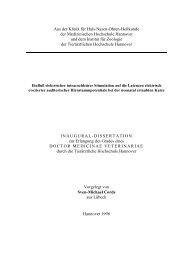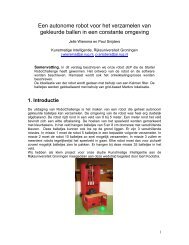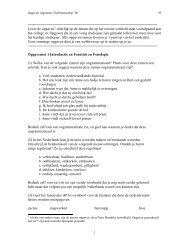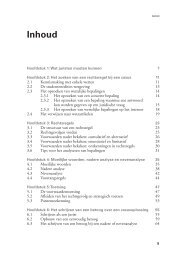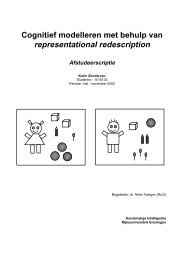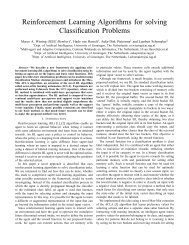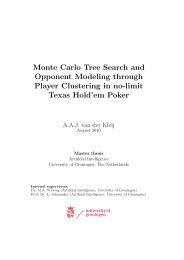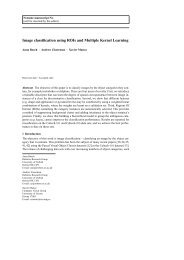Presuppositions in Spoken Discourse
Presuppositions in Spoken Discourse
Presuppositions in Spoken Discourse
You also want an ePaper? Increase the reach of your titles
YUMPU automatically turns print PDFs into web optimized ePapers that Google loves.
Chapter 5<br />
there cannot be a l<strong>in</strong>k because there is no context. <strong>Presuppositions</strong> can be used <strong>in</strong><br />
discourses without a l<strong>in</strong>guistic antecedent just because the context allows them to<br />
make a l<strong>in</strong>k with the preced<strong>in</strong>g discourse. The context and the l<strong>in</strong>k between it and<br />
the presupposed <strong>in</strong>formation makes accommodation felicitous.<br />
If the descriptive content contributed by an utterance where too appears is<br />
specific enough or constra<strong>in</strong>ed enough <strong>in</strong> the context where it is used so that any<br />
ambiguity <strong>in</strong> <strong>in</strong>terpretation is ruled out, then the presupposition triggered by too<br />
should be able to accommodate as well. This is also what we f<strong>in</strong>d <strong>in</strong> the one<br />
example of a plausible case from the corpus data of a presupposition triggered by<br />
too that needs to be accommodated:<br />
(42) An example of too trigger<strong>in</strong>g a presupposition that has to be globally<br />
accommodated (2-14 411)<br />
Speaker A He doesn‘t see why you should make - bother to make [pr] why you<br />
should - - be feel forced to make provision for the disabled . particularly<br />
the wheelchairs who are the voluble ones and I agree with him there -<br />
<strong>in</strong> both . underground and - [@m] buses so long as one form of [tra]<br />
public transport *is* available that should be reasonable -<br />
Speaker C *[M]*<br />
Speaker A [@m] and he said the Swedes have gone absolutely overboard on<br />
mak<strong>in</strong>g everyth<strong>in</strong>g possible for the disabled which also emerged <strong>in</strong><br />
pass<strong>in</strong>g from this paper *. and he says.*<br />
Speaker C * They‘re probably richer.*<br />
Speaker A Yes, but he says now they‘ve spent all this money they‘re f<strong>in</strong>d<strong>in</strong>g they<br />
can‘t afford to keep it up<br />
Speaker C Oh . [m], yeah.<br />
Speaker A (laughs - )<br />
Speaker C Couldn‘t you have all loos . designed so that [dei] disabled people can<br />
use them too? **<br />
Speaker A * I th<strong>in</strong>k you could, yes.*<br />
In the above example the presupposition triggered is that someone other than<br />
disabled people can use all loos. This presupposition can be accommodated and the<br />
result<strong>in</strong>g mean<strong>in</strong>g is clear, non-disabled people are able to use all loos now. There<br />
are two reasons why accommodation here is felicitous. First, the theme is that all<br />
loos can be used, someth<strong>in</strong>g that is trivially true. Second, <strong>in</strong>dividuals actually only<br />
belong to one of two categories, they are disabled or they are not disabled. Because<br />
the focus element <strong>in</strong> the utterance with too is disabled people the most likely focus<br />
element for the presupposition is non-disabled people. These two factors make<br />
accommodation felicitous.<br />
Expressions with greater descriptive content accommodate easier because<br />
they are more able to be l<strong>in</strong>ked <strong>in</strong> some way with the context, but, as the above<br />
examples shows, only if there is a context. Presuppositional expressions can have<br />
arguments that may be already given <strong>in</strong> the discourse so that part of the<br />
presupposed <strong>in</strong>formation is immediately able to be <strong>in</strong>tegrated <strong>in</strong> the discourse<br />
record when the presupposition is triggered. Heim (1982) argues that this type of<br />
136



